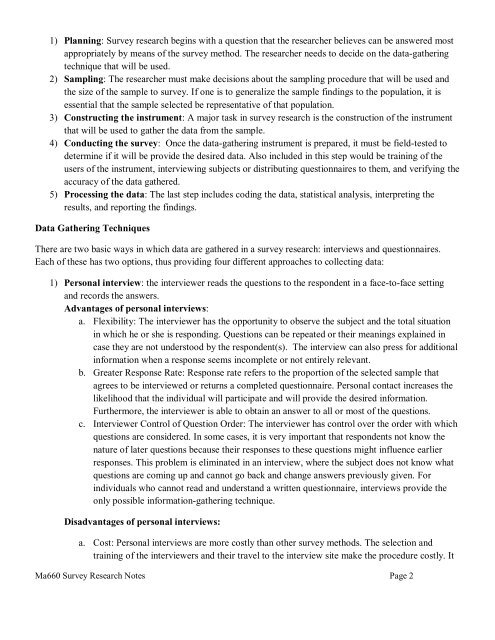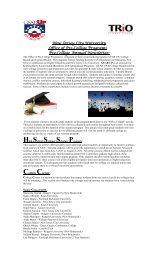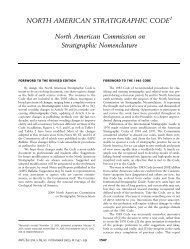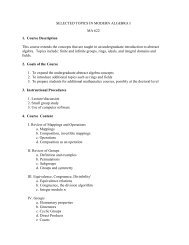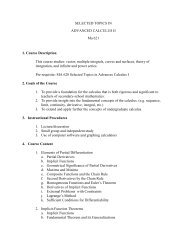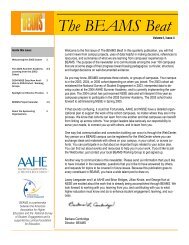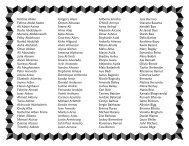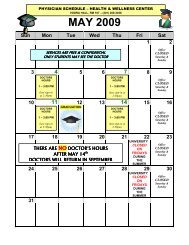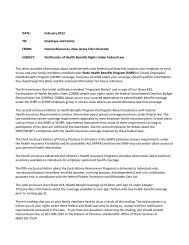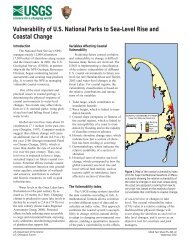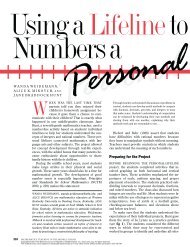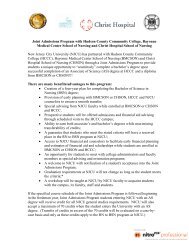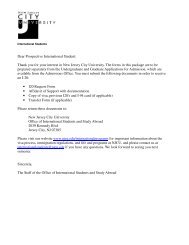Survey Research Types of Surveys Surveys are classified according ...
Survey Research Types of Surveys Surveys are classified according ...
Survey Research Types of Surveys Surveys are classified according ...
You also want an ePaper? Increase the reach of your titles
YUMPU automatically turns print PDFs into web optimized ePapers that Google loves.
1) Planning: <strong>Survey</strong> research begins with a question that the researcher believes can be answered most<br />
appropriately by means <strong>of</strong> the survey method. The researcher needs to decide on the data-gathering<br />
technique that will be used.<br />
2) Sampling: The researcher must make decisions about the sampling procedure that will be used and<br />
the size <strong>of</strong> the sample to survey. If one is to generalize the sample findings to the population, it is<br />
essential that the sample selected be representative <strong>of</strong> that population.<br />
3) Constructing the instrument: A major task in survey research is the construction <strong>of</strong> the instrument<br />
that will be used to gather the data from the sample.<br />
4) Conducting the survey: Once the data-gathering instrument is prep<strong>are</strong>d, it must be field-tested to<br />
determine if it will be provide the desired data. Also included in this step would be training <strong>of</strong> the<br />
users <strong>of</strong> the instrument, interviewing subjects or distributing questionnaires to them, and verifying the<br />
accuracy <strong>of</strong> the data gathered.<br />
5) Processing the data: The last step includes coding the data, statistical analysis, interpreting the<br />
results, and reporting the findings.<br />
Data Gathering Techniques<br />
There <strong>are</strong> two basic ways in which data <strong>are</strong> gathered in a survey research: interviews and questionnaires.<br />
Each <strong>of</strong> these has two options, thus providing four different approaches to collecting data:<br />
1) Personal interview: the interviewer reads the questions to the respondent in a face-to-face setting<br />
and records the answers.<br />
Advantages <strong>of</strong> personal interviews:<br />
a. Flexibility: The interviewer has the opportunity to observe the subject and the total situation<br />
in which he or she is responding. Questions can be repeated or their meanings explained in<br />
case they <strong>are</strong> not understood by the respondent(s). The interview can also press for additional<br />
information when a response seems incomplete or not entirely relevant.<br />
b. Greater Response Rate: Response rate refers to the proportion <strong>of</strong> the selected sample that<br />
agrees to be interviewed or returns a completed questionnaire. Personal contact increases the<br />
likelihood that the individual will participate and will provide the desired information.<br />
Furthermore, the interviewer is able to obtain an answer to all or most <strong>of</strong> the questions.<br />
c. Interviewer Control <strong>of</strong> Question Order: The interviewer has control over the order with which<br />
questions <strong>are</strong> considered. In some cases, it is very important that respondents not know the<br />
nature <strong>of</strong> later questions because their responses to these questions might influence earlier<br />
responses. This problem is eliminated in an interview, where the subject does not know what<br />
questions <strong>are</strong> coming up and cannot go back and change answers previously given. For<br />
individuals who cannot read and understand a written questionnaire, interviews provide the<br />
only possible information-gathering technique.<br />
Disadvantages <strong>of</strong> personal interviews:<br />
a. Cost: Personal interviews <strong>are</strong> more costly than other survey methods. The selection and<br />
training <strong>of</strong> the interviewers and their travel to the interview site make the procedure costly. It<br />
Ma660 <strong>Survey</strong> <strong>Research</strong> Notes Page 2


